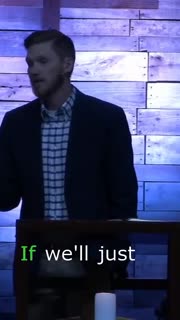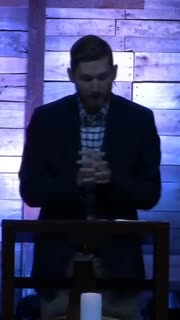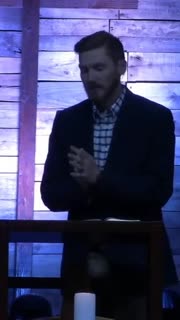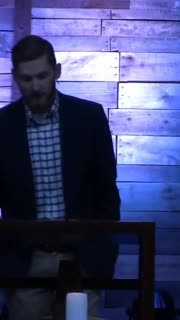Realigning Priorities: A Call to Spiritual Renewal
Devotional
Sermon Summary
Bible Study Guide
Sermon Clips
### Quotes for Outreach
1. "Frequently when we're met with opposition, it means we just... We just kind of give up. It's often too easy to just stop once things get difficult. And that's what they did. They met this opposition. So they stopped the work or slowed way down for about six years as they rebuilt the temple for God. And then they just stopped completely." [34:42]
2. "It's easy to get our priorities out of whack, isn't it? It's easy to get things off balance all of a sudden in our lives. As the people, as we're seeing here this morning, God had told them, but they didn't. They began to make excuses as to why their priorities were off. We often find ourselves focusing on what's easy to accomplish, what nobody opposes, what doesn't take all that much brain power, what doesn't require too much of a relationship." [40:01]
3. "If the devil can't make you sin, he will make you busy. If he can't make you sin, he will just make you busy enough to think you don't have time for God. I got thinking about that this weekend. Boy, it hit me. It took my breath away, apparently. But for the people of God, they had their priorities so mixed up. But I think that this busyness is what gets us in the wrong ways." [48:28]
4. "If we'll just let life slow down a little bit to spend time and to care for our soul, our churches might begin to look differently. Our communities might begin to be changed, to actually see this love of Jesus Christ that can be poured out upon all people. It's a grace that's sufficient for us, but we have to stop long enough to know that that's what God wants for us." [50:09]
5. "So God's calling His people back. Come back. And He says, would you just consider your ways? Maybe your ways are not always right. That's a tough one for us to admit. Maybe I'm not always right. Maybe I do need to examine my life. Maybe there are things going on in your life that you need to stop for just a minute and say, God, would you just... I'm scared to go through with this, God, but would you just help me through the things that I'm trying to shove down as far as possible so I don't have to acknowledge the bad things in my life." [53:37]
### Quotes for Members
1. "Haggai is pointing out the word of the Lord to his people. And he's saying, you are essentially starving because you've become complacent in where you're at with building your own houses. You're perfecting your own things, and yet my house has nothing done to it. You're not doing the right things. And so I would say that the people at this point have their priorities flip-flopped. I think it's easy for that to happen, but God is calling us out of a life of priorities to what we want." [36:29]
2. "So for us today, he would say consider your ways. What do you do? How do you spend your time? The cool thing about our cell phones is that, or for me at least, every Sunday morning at night, it pops up and tells me what my screen time was this week. Does your phone do that? It tells you how long you spent on your phone on average every day that week. And if you want more information about it, you can see which apps you spent the most amount of time in. So go and look at your phone after church today and see where your priorities lie. Do you spend more time with God or do you spend more time on your phone?" [45:05]
3. "But it's almost like we don't ever stop. It's like we're too scared to actually face the things that God wants us to face in our lives so that we can have a relationship with God. Well, if I just stay busy enough, long enough, I won't have to admit my sins and my faults. I won't have to bring that up. I won't have to forgive anyone because if I stay busy enough, then I don't have to do any of the things that actually matter. But if we'll just admit those things, if we just ask forgiveness and face some of the harder things in life for just a few minutes, imagine what God can do through His people that are willing to humble themselves and let a nation be changed, let churches be changed, let your family be changed." [51:17]
4. "So the temple is what's significant to them that God says, just go back, go and collect the supplies and bring them back. But He says, you've planted much and you harvest little. You eat but you're not satisfied. You drink but are still thirsty. You put on clothes but you cannot keep warm. Your wages disappear as though you were putting them in pockets filled with holes. He's saying you're trying to do everything you can to be as full as you possibly can, but you never will until God is the one that becomes our sustenance. Consider your ways. Become a people of God instead of just these people be my people." [52:21]
5. "So for the Israelites, they could have easily regretted not building the temple, but God sends them a wake-up call out of their complacency. And so they begin to build the temple again. So this is where I want to close this morning. So I'm going to ask Barb, would you play for us for just a few moments? But think of the regrets that these people, the Israelites, could have felt about having not built the temple. Okay, so the temple they're going to build becomes the setting for God's holy people. It becomes the place where Jesus is dedicated. The temple that they build is the place that Simeon in Luke chapter 2 prophesied about eagerly awaiting the arrival of the Messiah." [01:01:54]
Ask a question about this sermon
1. "Frequently when we're met with opposition, it means we just... We just kind of give up. It's often too easy to just stop once things get difficult. And that's what they did. They met this opposition. So they stopped the work or slowed way down for about six years as they rebuilt the temple for God. And then they just stopped completely." [34:42]
2. "It's easy to get our priorities out of whack, isn't it? It's easy to get things off balance all of a sudden in our lives. As the people, as we're seeing here this morning, God had told them, but they didn't. They began to make excuses as to why their priorities were off. We often find ourselves focusing on what's easy to accomplish, what nobody opposes, what doesn't take all that much brain power, what doesn't require too much of a relationship." [40:01]
3. "If the devil can't make you sin, he will make you busy. If he can't make you sin, he will just make you busy enough to think you don't have time for God. I got thinking about that this weekend. Boy, it hit me. It took my breath away, apparently. But for the people of God, they had their priorities so mixed up. But I think that this busyness is what gets us in the wrong ways." [48:28]
4. "If we'll just let life slow down a little bit to spend time and to care for our soul, our churches might begin to look differently. Our communities might begin to be changed, to actually see this love of Jesus Christ that can be poured out upon all people. It's a grace that's sufficient for us, but we have to stop long enough to know that that's what God wants for us." [50:09]
5. "So God's calling His people back. Come back. And He says, would you just consider your ways? Maybe your ways are not always right. That's a tough one for us to admit. Maybe I'm not always right. Maybe I do need to examine my life. Maybe there are things going on in your life that you need to stop for just a minute and say, God, would you just... I'm scared to go through with this, God, but would you just help me through the things that I'm trying to shove down as far as possible so I don't have to acknowledge the bad things in my life." [53:37]
### Quotes for Members
1. "Haggai is pointing out the word of the Lord to his people. And he's saying, you are essentially starving because you've become complacent in where you're at with building your own houses. You're perfecting your own things, and yet my house has nothing done to it. You're not doing the right things. And so I would say that the people at this point have their priorities flip-flopped. I think it's easy for that to happen, but God is calling us out of a life of priorities to what we want." [36:29]
2. "So for us today, he would say consider your ways. What do you do? How do you spend your time? The cool thing about our cell phones is that, or for me at least, every Sunday morning at night, it pops up and tells me what my screen time was this week. Does your phone do that? It tells you how long you spent on your phone on average every day that week. And if you want more information about it, you can see which apps you spent the most amount of time in. So go and look at your phone after church today and see where your priorities lie. Do you spend more time with God or do you spend more time on your phone?" [45:05]
3. "But it's almost like we don't ever stop. It's like we're too scared to actually face the things that God wants us to face in our lives so that we can have a relationship with God. Well, if I just stay busy enough, long enough, I won't have to admit my sins and my faults. I won't have to bring that up. I won't have to forgive anyone because if I stay busy enough, then I don't have to do any of the things that actually matter. But if we'll just admit those things, if we just ask forgiveness and face some of the harder things in life for just a few minutes, imagine what God can do through His people that are willing to humble themselves and let a nation be changed, let churches be changed, let your family be changed." [51:17]
4. "So the temple is what's significant to them that God says, just go back, go and collect the supplies and bring them back. But He says, you've planted much and you harvest little. You eat but you're not satisfied. You drink but are still thirsty. You put on clothes but you cannot keep warm. Your wages disappear as though you were putting them in pockets filled with holes. He's saying you're trying to do everything you can to be as full as you possibly can, but you never will until God is the one that becomes our sustenance. Consider your ways. Become a people of God instead of just these people be my people." [52:21]
5. "So for the Israelites, they could have easily regretted not building the temple, but God sends them a wake-up call out of their complacency. And so they begin to build the temple again. So this is where I want to close this morning. So I'm going to ask Barb, would you play for us for just a few moments? But think of the regrets that these people, the Israelites, could have felt about having not built the temple. Okay, so the temple they're going to build becomes the setting for God's holy people. It becomes the place where Jesus is dedicated. The temple that they build is the place that Simeon in Luke chapter 2 prophesied about eagerly awaiting the arrival of the Messiah." [01:01:54]










